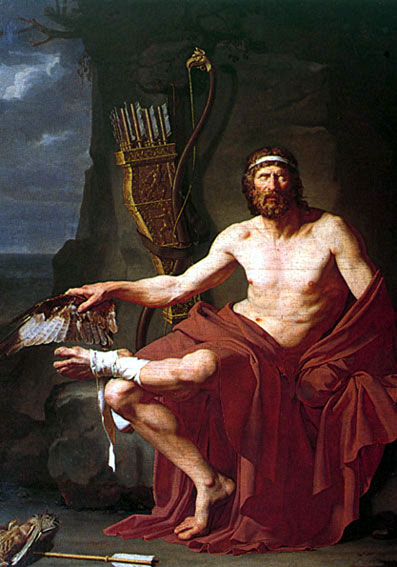- Philoctetes (Sophocles)
Infobox_Play | name = Philoctetes

caption = Philoctetes by Jean-Germain Drouais
writer =Sophocles
chorus = Greek Sailors
characters =Odysseus Neoptolemus Philoctetes
a spyHeracles
setting = Before a cave atLemnos "Philoctetes" ( _el. Φιλοκτήτης / "Philoktētēs") is a play by
Sophocles (Aeschylus andEuripides also each wrote a "Philoctetes" but theirs do not survive). It was first performed at theFestival of Dionysus in409 BC , where it won first prize. The story takes place during theTrojan War (after the events of theIliad , and before theTrojan Horse ). It describes the attempt byNeoptolemus andOdysseus to bring the disabledPhiloctetes with them to Troy.Background
When
Heracles was near death (the subject of another play by Sophocles -The Trachiniae ), he wished to be burned on a funeral pyre while still alive. No one but Philoctetes would light the fire, and in return for this favor Heracles gives him his bow. Philoctetes leaves with the others to participate in theTrojan War , but gets bitten on the foot by a snake. The bite leaves him in constant agony, and emits a horrible smell. For this he is left by Odysseus on the desert islandLemnos .Ten years pass, and the Greeks capture the Trojan
seer Helenus , son ofPriam . He foretells that they will require Philoctetes and the bow of Heracles in order to win the war. So Odysseus sails back to Lemnos with Neoptolemus (a late arriver to the Trojan War and son ofAchilles ) in order to get him. The task will not be easy, as Philoctetes bitterly hates Odysseus and the Greeks for leaving him there.tory
"Philoctetes" begins with their arrival on the island. Odysseus explains to Neoptolemus that he must perform a shameful action in order to garner future glory - to take Philoctetes by tricking him with a false story while Odysseus hides. Neoptolemus is portrayed as an honorable boy, and so it takes some persuading in order for him to play this part. In order to gain Philoctetes's trust, he tricks him into thinking he hates Odysseus as well. Odysseus has his father's armor. He tells Philoctetes that this armor was his right by birth, and Odysseus would not give it up to him. After gaining his trust and offering him a ride home, he is allowed to look at the bow of Heracles.
Neoptolemus holds the bow while Philoctetes is going into an unbearable fit of pain in his foot. Feeling ashamed, Neoptolemus debates giving it back to him. Odysseus appears, and a series of arguments ensue. Eventually Neoptolemus's conscience gains the upper hand, and he returns the bow. After many threats made on both sides, Odysseus flees. Neoptolemus then tries to talk Philoctetes into coming to Troy by his own free will, but to no avail, and in the end Neoptolemus consents to take Philoctetes back to Greece, even though that means that he will be exposed to the anger of the army. This appears to be the conclusion of the play: but as they are leaving, Heracles (now a deity) appears above them and commands Philoctetes to go to Troy and be cured. Philoctetes willingly obeys him. [Summary description of the play; http://classics.uc.edu/~johnson/tragedy/summaries/philoctetes.html]
The play ends here. When Philoctetes later fights in Troy, his foot gets healed, and he wins glory killing many Trojans (including Paris).
The Philoctetes Project
The story of Philoctetes, dealing with the wounded man and the interwoven relationships with others, has been noted not infrequently. In 2005 Bryan Doerries, writer and director, began a series of readings of the play in the
New York city area. Noting the reactions of the audience to the reading, especially related to the reactions of audience members to the interaction of the suffering soldier and the conflicted caregiver, he and others started the Philoctetes Project [ [http://www.philoctetesproject.org/ The Philoctetes Project ] ] , presenting such readings especially to audiences of medical professionals and students.A number of readings were followed by a panel discussion about doctor-patient relationships, involving presenters in psychiatry, physicians, and military medical personnel [Bryan Doerries, "About the Philoctetes Project", The Key Reporter [Phi Beta Kappa] , Spring 2008: http://staging.pbk.org/AM/Template.cfm?Section=TKR_Archives&Template=/CM/ContentDisplay.cfm&ContentIDID=2674] among others.
The concept has also been extended to training of medical students, such as a presentation also in 2007 to the first year medical class at
Weill Medical College ofCornell University [Abigail Zuger, "The Difficult Patient, a Problem as Old as History (or Older", The Key Reporter [Phi Beta Kappa] , Spring 2008: http://staging.pbk.org/AM/Template.cfm?Section=TKR_Archives&Template=/CM/ContentDisplay.cfm&ContentIDID=2674/] , involving not only the students but faculty members, including presentation and discussion of an actual case dealing with the patient-caregiver interactions that parallel the situation that Sophocles presented.In 2008 at a conference dedicated to finding new ways to help
US Marines recover from post-traumatic stress and other disorders after serving inIraq orAfghanistan , four New York actors presented dramatic reading from this play andAjax (Sophocles) , focused on physical and psychological wounds inflicted on the warrior. [http://www.latimes.com/news/local/la-me-combat15-2008aug15,0,6770815.story Story by Tony Perry, Los Angeles Times Staff Writer] .Translations
* Thomas Francklin, 1759 - verse: [http://classics.mit.edu/Sophocles/philoct.html full text]
*Richard C. Jebb , 1904 - prose: [http://www.perseus.tufts.edu/cgi-bin/ptext?lookup=soph.+phil.+1 full text]
* Francis Storr, 1912 - verse
* David Grene, 1957 - verse
* Gregory McNamee, 1986 - prose: [http://www.gutenberg.org/etext/806 full text]Footnotes
Wikimedia Foundation. 2010.
